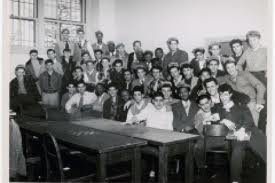Teaching Practices and Smaller Classes
Large classes of 50-plus students were common in early 20th century schools, especially in cities.

Class size fell throughout the past century to around 30 students in elementary and secondary classrooms, dipping to 25 and rising to 35 in times of budgetary retrenchment. Beginning in the 1980s, state efforts to reduce class size to 20 students or less per classroom, especially in primary grades, led legislatures to fund smaller class size in order to lift student achievement. Research studies had established that smaller class sizes (numbers varied in these studies from 15 to 25 student) produced gains in test scores.
For example, in the Tennessee experiments in reduced class size in elementary schools—a small class was

Class size fell throughout the past century to around 30 students in elementary and secondary classrooms, dipping to 25 and rising to 35 in times of budgetary retrenchment. Beginning in the 1980s, state efforts to reduce class size to 20 students or less per classroom, especially in primary grades, led legislatures to fund smaller class size in order to lift student achievement. Research studies had established that smaller class sizes (numbers varied in these studies from 15 to 25 student) produced gains in test scores.
For example, in the Tennessee experiments in reduced class size in elementary schools—a small class was
